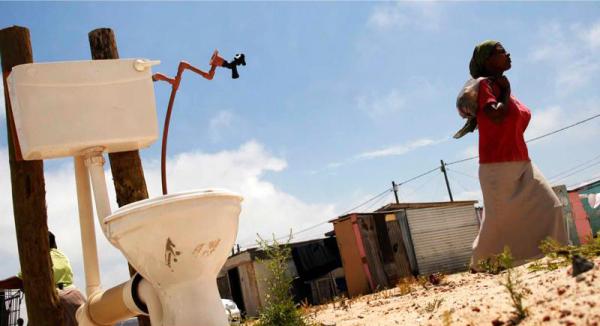Flush toilet audit begins in Khayelitsha

This week the Social Justice Coalition (SJC) began a second social audit of janitorial services in Khayelitsha. This time the organisation is looking at flush toilets.
On Wednesday the Human Rights Commission released a report critical of the City of Cape Town’s chemical toilet provision in informal settlements. Their findings made use of information in the SJC’s first social audit, carried out in April last year.
To launch the second social audit, the SJC held a meeting on Monday in Green Point Hall in Khayelitsha. The meeting was attended by about 80 people including Khayelitsha residents as well as several activist organisations.
The SJC’s Axolile Notywala told the meeting, “What we are asking for is monitoring of existing toilets, maintenance, proper co-ordination between different departments within the municipality and meaningful engagement between government and residents.”
A Khayelitsha resident who is participating in the audit, Nosiphelele Msesiwa, worked as a team leader on a public works programme which monitored the chemical toilets provided by a company called Mshengu. She told the meeting, “When I was a monitor of Mshengu toilets we were not provided with the necessary equipment and uniform. There were no gloves and masks to use. I had one pair of overalls and boots to use for six months and we had to use our own T-shirts.”
Residents at the meeting raised a number of problems with toilets. They were worried about safety, the number of households sharing a toilet, the poor maintenance of some toilets, the employment of janitors from outside the areas where the toilets were based, and that toilets were not disabled-friendly.
A representative of the Department of Water and Sanitation, Joseph Tsatsire, said that with the 2014/15 financial year janitors were now provided with full uniform and equipment. He said that masks were not part of the equipment provided.
According to the 2011 census there are 204 informal settlements in Cape Town and over 140,000 households. Tsatsire said it is hard to provide toilets to meet the needs of this number of households.
“We face challenges of density, legal restrictions, technical restrictions and infrastructure in informal settlements, which is why we have the ratio of one-to-five, meaning five households are to share one toilet. Also we allocate one janitor for 25 toilets if they are within 200m of each other,” said Tsatsire.
The audit continued through the week. A public hearing on the audit will be held tomorrow at Matthew Goniwe High School in Site B, Khayelitsha.
Support independent journalism
Donate using Payfast

Don't miss out on the latest news
We respect your privacy, and promise we won't spam you.

This article is licensed under a Creative Commons Attribution-NoDerivatives 4.0 International License.
